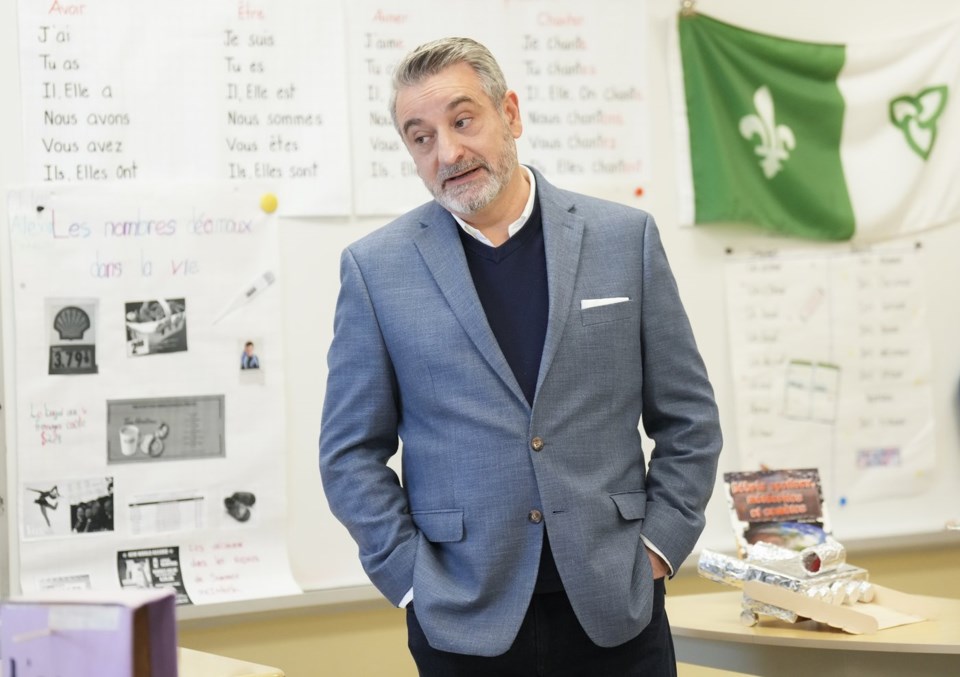Education
Ontario Education Minister Targets School Board Expenses Amid Controversy

The expenses of trustees from several Ontario school boards are facing scrutiny from Education Minister Paul Calandra, following revelations about a $145 Apple Watch band and a $15 milkshake. The minister’s focus on these expenses is part of a broader investigation into what he describes as “mismanagement” within the Toronto Catholic District School Board and four other boards currently under government supervision.
Calls for Governance Reform
On the last day of school in June, Calandra indicated that significant changes to school board governance were imminent, stating that the role of trustees requires reevaluation. He expressed doubts about returning the boards under supervision back to their trustees, suggesting he is considering eliminating the position entirely. Although he dismissed rumors of plans to abolish school boards altogether, he emphasized that his focus is specifically on the role of elected trustees. “I have been clear that the governance changes being considered are regarding the role of elected school board trustees,” Calandra noted in a recent statement.
The appointed supervisors are meticulously reviewing the financial claims submitted by trustees, particularly those from Markus de Domenico, the chair of the Toronto Catholic District School Board. Receipts for various expenses, including the aforementioned milkshake, a late-night McDonald’s order, and the Apple Watch band, have drawn significant attention.
Trustee Defends Expenses
De Domenico contends that the scrutiny of his expenses is politically motivated, stemming from his vocal opposition to Calandra’s initiatives, which he argues undermine the voices of trustees and parents. “I’ve been making the case from the beginning that supervision hurts kids,” he stated in an interview. “It hurts students, and it’s clearly gotten under his skin.” He defends his choice to expense items like the milkshake, explaining that it was purchased during a meeting with a parent, emphasizing that he does not have an office for formal meetings.
The milkshake, a cookie dough variety from a local vendor, totaled $15.81 including tax. De Domenico remarked, “I think it’s such a silly attempt to smear somebody.” He also clarified the circumstances surrounding the McDonald’s receipt, attributing it to a late-night food stop after a meeting. Regarding the Apple Watch band, he stated, “We buy our technical devices, approved by the board, approved by the ministry, to have technical devices like laptops, Apple watches, a phone, whatever. The band wore out. I put a new one on it, and that’s what the story is.”
Calandra responded to De Domenico’s defense by stressing that the Toronto Catholic District School Board was placed under supervision due to “years of financial mismanagement,” noting an accumulated deficit of $75.2 million. He stated, “Ontario families deserve better than trustees who treat the classroom like their personal expense account.”
Concerns About Underfunding
Critics of Calandra’s approach, including Chandra Pasma, the New Democratic Party’s education critic, argue that the real issue lies in the government’s underfunding of education. Pasma stated that eliminating the role of trustees would diminish parents’ ability to engage in their children’s education. “Families deserve accountable, local representation who know their communities and who can stand up for students and parents,” she asserted, labeling the government’s actions a “dangerous power grab.”
The Ontario Autism Coalition highlighted the importance of trustees in their recent survey, noting that more than 28% of parents with children in their community had sought help from a trustee at least once in the past school year. The coalition warned that removing trustees could silence the voices of children, youth, and their families, leading to increased school exclusion rates and leaving more students without adequate educational support.
This ongoing controversy raises critical questions about the governance of Ontario’s educational institutions and the balance between oversight and local representation. As the situation develops, the implications for students, parents, and the broader educational landscape remain to be seen.
This report was first published on September 8, 2025 by The Canadian Press.
-

 World3 months ago
World3 months agoScientists Unearth Ancient Antarctic Ice to Unlock Climate Secrets
-

 Entertainment3 months ago
Entertainment3 months agoTrump and McCormick to Announce $70 Billion Energy Investments
-

 Lifestyle3 months ago
Lifestyle3 months agoTransLink Launches Food Truck Program to Boost Revenue in Vancouver
-

 Science3 months ago
Science3 months agoFour Astronauts Return to Earth After International Space Station Mission
-

 Technology2 months ago
Technology2 months agoApple Notes Enhances Functionality with Markdown Support in macOS 26
-

 Top Stories2 weeks ago
Top Stories2 weeks agoUrgent Update: Fatal Crash on Highway 99 Claims Life of Pitt Meadows Man
-

 Sports3 months ago
Sports3 months agoSearch Underway for Missing Hunter Amid Hokkaido Bear Emergency
-

 Politics3 months ago
Politics3 months agoUkrainian Tennis Star Elina Svitolina Faces Death Threats Online
-

 Technology3 months ago
Technology3 months agoFrosthaven Launches Early Access on July 31, 2025
-

 Politics3 months ago
Politics3 months agoCarney Engages First Nations Leaders at Development Law Summit
-

 Entertainment3 months ago
Entertainment3 months agoCalgary Theatre Troupe Revives Magic at Winnipeg Fringe Festival
-

 Politics2 weeks ago
Politics2 weeks agoShutdown Reflects Democratic Struggles Amid Economic Concerns





















